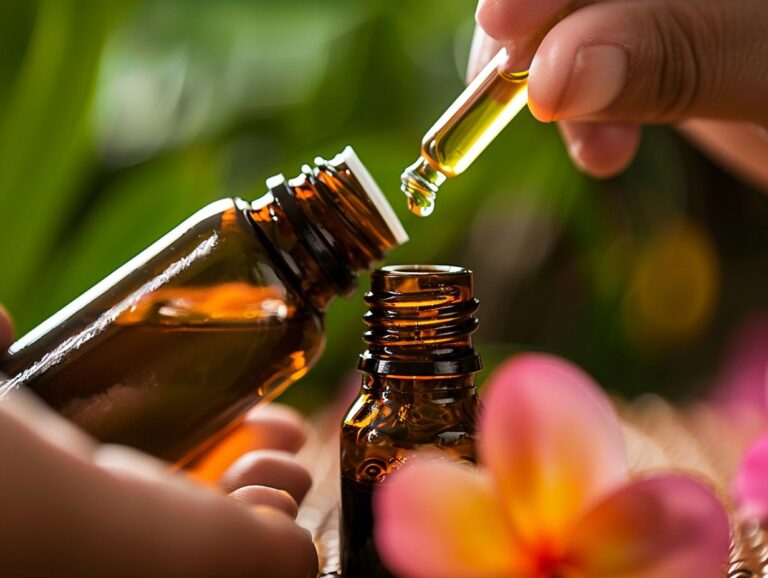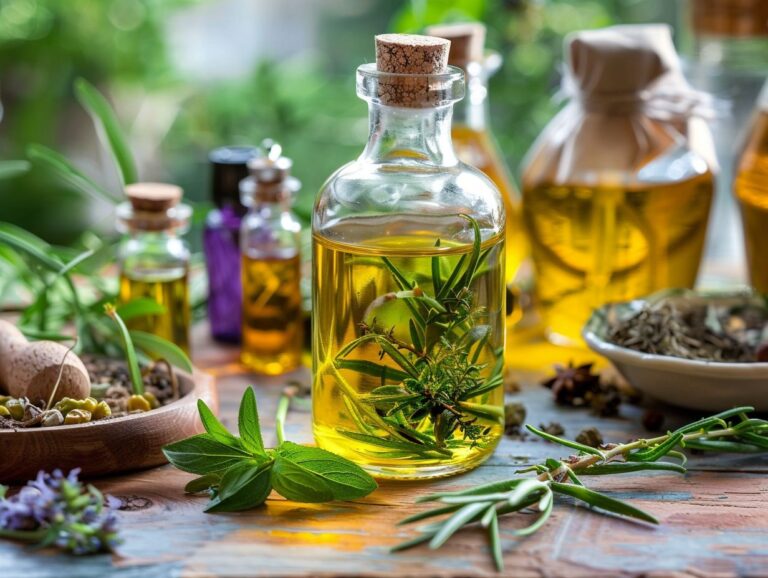Where to Apply Essential Oils for Stress
Essential oils have been used for centuries for their therapeutic properties, particularly in relieving stress and promoting relaxation. In this article, we will explore the benefits of essential oils for stress relief and discuss the best essential oils to use for this purpose. We will also provide guidance on how to use essential oils effectively, including inhalation, topical application, and diffusion. We will discuss where to apply essential oils for hypertension on the body for maximum stress-relieving effects and share important precautions and safety measures to keep in mind. Join us as we uncover the power of essential oils in combating stress and enhancing well-being.
Key Takeaways:
What Are Essential Oils?
Essential oils are highly concentrated plant extracts known for their aromatic and therapeutic properties. They are commonly used in aromatherapy, skincare, and stress management.
These oils have been used for centuries across various cultures for their healing abilities. The history of essential oils can be traced back to ancient civilizations like Egypt, where they were valued for their medicinal and cosmetic benefits.
Fascinatingly, essential oils are extracted through processes like distillation, cold pressing, and solvent extraction, where the pure essence of the plant is captured. From lavender oil to tea tree oil, each type of essential oil offers unique benefits such as promoting relaxation, improving skin conditions, and boosting emotional well-being.
How Do Essential Oils Help with Stress?
Essential oils play a significant role in stress management by helping to reduce cortisol levels, the hormone associated with stress. The soothing aroma of essential oils promotes relaxation and emotional well-being.
The impact of essential oils on stress reduction goes beyond just their pleasant scents. Scientific studies have shown that certain essential oils such as lavender, chamomile, and rosemary can have a direct effect on the body’s stress response system. Research suggests that inhalation of these oils can help lower cortisol levels, reduce heart rate, and induce a sense of calmness. For example, a study published in the Journal of Alternative and Complementary Medicine found that inhaling lavender oil reduced cortisol levels and improved mood in participants.
What Are the Best Essential Oils for Stress?
Regarding stress relief, some of the best essential oils include lavender, known for its calming effects, bergamot for anxiety reduction, chamomile for relaxation, frankincense for emotional balance, and ylang-ylang for mood enhancement.
Each of these essential oils offers unique benefits for stress relief and emotional well-being:
- Lavender: Lavender oil is renowned for its ability to promote relaxation and reduce anxiety. Its gentle floral scent helps to calm the mind and body, making it a popular choice for aromatherapy and massage.
- Bergamot: Bergamot oil is excellent for reducing feelings of stress and tension. It has a citrusy aroma that uplifts the mood and helps to alleviate symptoms of anxiety and depression.
- Chamomile: Known for its soothing properties, chamomile oil is often used to induce relaxation and promote better sleep. Its gentle, fruity scent is comforting and helps to ease emotional stress.
- Frankincense: Frankincense oil is prized for its ability to promote emotional balance and clarity. Its warm, woody aroma is grounding and helps to reduce feelings of nervousness and restlessness.
- Ylang-Ylang: Ylang-ylang oil is uplifting and euphoric, making it ideal for combating feelings of sadness and low mood. Its sweet, floral fragrance is often used in perfumery and emotional support blends.
Lavender Oil
Lavender oil is a popular choice for promoting relaxation, improving sleep quality, and alleviating emotional symptoms such as anxiety and tension. Its calming aroma is well-known for its soothing effects on the mind and body.
Regarding relaxation, lavender oil has proven to be a versatile and effective natural remedy. Along with its calming scent, lavender oil contains compounds that have been shown to reduce stress levels and promote a sense of peace and tranquility. By diffusing a few drops of lavender oil in a room or adding it to a warm bath, individuals can create a serene environment conducive to unwinding after a long day.
The benefits of lavender oil extend to improving sleep quality. Studies have indicated that inhaling lavender oil before bedtime can lead to a more restful and undisturbed night’s sleep. Incorporating a few drops of lavender oil into a bedtime routine, whether through a diffuser or applying it topically to pulse points, can help promote a sense of calmness and relaxation, setting the stage for a peaceful slumber.
Emotionally, lavender oil serves as a valuable tool for managing feelings of anxiety and tension. The soothing properties of lavender oil can help to ease nervousness, reduce feelings of restlessness, and promote an overall sense of well-being. Carrying a small vial of lavender oil in a purse or pocket provides a convenient way to access its calming benefits throughout the day, offering a quick and effective solution for combating moments of stress and anxiety.
Bergamot Oil
Bergamot oil is effective in reducing anxiety, uplifting mood, and relieving tension. Its citrusy scent helps in promoting a sense of well-being and inner peace.
This essential oil is rich in compounds like limonene and linalool, known for their calming properties. Inhalation of bergamot oil through diffusers or inhalers can help alleviate stress and anxiety. It can be added to bathwater for a soothing soak or diluted in a carrier oil for a relaxing massage. A few drops on a handkerchief or pillow before bedtime can aid in a restful night’s sleep.
Chamomile Oil

Chamomile oil is known for its calming effect, aiding in decision-making and offering stress relief. Its gentle aroma promotes relaxation and mental clarity.
Through its soothing properties, chamomile oil has been hailed for its ability to induce a sense of serenity and tranquility. As a natural remedy, it is often used to alleviate feelings of anxiety and overwhelm, allowing individuals to approach decision-making with a clear mind and a calm disposition.
The therapeutic benefits of chamomile oil extend beyond just emotional well-being; its anti-inflammatory properties can also help soothe physical symptoms of stress, such as tension headaches and muscle aches. Whether inhaled through aromatherapy, mixed into a relaxing bath, or applied topically in a massage oil, chamomile oil provides a holistic approach to managing stress and promoting overall well-being.
Frankincense Oil
Frankincense oil is renowned for promoting inner peace, encouraging deep breaths, and supporting self-care routines. Its woody aroma offers numerous benefits for emotional and physical well-being.
Regarding fostering inner peace, this essential oil has calming properties that can help soothe a busy mind and create a sense of tranquility. The act of inhaling the fragrance can aid in deep breathing exercises, promoting relaxation and reducing stress levels. Incorporating frankincense oil into daily rituals, such as adding a few drops to a diffuser during meditation or mixing it with a carrier oil for a soothing massage, can enhance self-care practices and contribute to overall well-being.
Ylang Ylang Oil
Ylang ylang oil is ideal for balancing mood, nourishing the skin, enhancing massage experiences, and addressing emotional symptoms. Its floral fragrance offers a sense of tranquility and relaxation.
Due to its calming properties, ylang-ylang oil is often used in aromatherapy to alleviate stress and anxiety. When applied topically, it can help improve skin elasticity and reduce signs of aging. For an indulgent massage experience, blend a few drops of ylang-ylang oil with a carrier oil like coconut or jojoba.
To create a peaceful ambiance at home, add a few drops of ylang-ylang oil to a diffuser or bath water. Remember to perform a patch test before widespread use to ensure no adverse reactions.
How to Use Essential Oils for Stress Relief?
Essential oils can be used for stress relief through methods such as inhalation, topical application, and blending. Each technique offers unique benefits for relaxation and emotional support.
Regarding inhalation, one can add a few drops of essential oil to a bowl of hot water or a diffuser, allowing the aroma to fill the room. Inhaling lemon or lavender oils can help calm the mind and reduce anxiety.
For topical application, mix a few drops of essential oil with a carrier oil like coconut or almond oil, then massage into the skin. This can promote relaxation and soothe muscle tension.
Experimenting with different oil blends can lead to powerful synergies that enhance the overall stress-relief experience.
Inhalation
Inhalation of essential oils through a diffuser or direct inhalation can have a profound impact on mood, relaxation, and stress relief. The aromatic properties of the oils influence the mind and body through the breath.
Essential oils contain natural compounds that interact with the limbic system, the part of the brain responsible for emotions and memories. When inhaled, these compounds trigger responses that can uplift mood, reduce anxiety, and induce a sense of calm. Using a diffuser disperses the oils into the air, creating a peaceful ambiance throughout a room. Direct inhalation, on the other hand, involves a more concentrated experience where the oils are inhaled directly from the bottle or a tissue. This method provides quick relief in stressful situations or moments of tension.
Topical Application
Topical application of essential oils on the skin, after conducting a patch test and dilution with a carrier oil, can provide localized benefits for stress relief and skin health.
Applying essential oils directly to the skin can have various therapeutic effects, ranging from calming the mind to improving skin conditions. When using essential oils for stress relief purposes, it is essential to dilute them properly to prevent skin irritations or adverse reactions.
Patch testing is crucial to check for any allergic responses before widespread application. Mixing essential oils with a carrier oil like coconut, almond, or jojoba oil helps reduce skin sensitivity and ensures better absorption.
Whether it’s a relaxing massage or targeting specific skin concerns, the methodical and gentle application of essential oils can enhance wellbeing and promote healthier skin.
Diffusion

By utilizing diffusion, the oils’ aromatic molecules disperse easily into the air, reaching your olfactory senses and triggering positive responses in the brain. This process not only promotes relaxation but also boosts focus and mental alertness, aiding in concentration and cognitive functioning.
The inhalation of essential oils through diffusion can deeply impact your emotional well-being by influencing the limbic system, the brain region responsible for emotions and memories. This direct connection can lead to mood enhancements, stress reduction, and a sense of overall well-being.
To maximize the benefits, it’s recommended to use a high-quality diffuser that offers various settings for intensity and duration. Experiment with different essential oil blends to find what works best for your needs and preferences, and don’t forget to clean your diffuser regularly to ensure optimal performance.
Where to Apply Essential Oils for Stress?
Applying essential oils to specific pulse points such as the neck, wrists, abdomen, and soles of feet can target stress relief more effectively. These strategic locations enhance the absorption and diffusion of the oils.
When applying essential oils to the wrist, consider diluting them with a carrier oil to prevent skin irritation. The neck region, being close to the nose, allows for easy inhalation of the calming aroma. The abdomen is a key area for digestive support; gently massaging oils in a clockwise motion can aid in relaxation. The soles of the feet, known for their extensive pores, offer quick absorption, making them ideal spots for nighttime application to promote restful sleep.
Temples and Forehead
Applying essential oils to the temples and forehead can help regulate heart rate, induce relaxation, and alleviate stress. The proximity to the nostrils enhances the aroma’s impact on stress management.
When essential oils are applied to these areas, the aromatic compounds interact with the olfactory receptors, sending calming signals to the brain.
- This signaling triggers the parasympathetic nervous system, responsible for the body’s rest and digest response, leading to a decrease in heart rate and a sense of calm.
- The gentle massaging motion of the application itself can help release tension in the facial muscles, aiding in relaxation.
- To optimize the benefits, it’s recommended to dilute essential oils with a carrier oil before applying to prevent skin irritation and ensure proper absorption.
Neck and Shoulders
Massaging essential oils onto the neck and shoulders targets tension and muscle stiffness, promoting relaxation and stress relief. The gentle massage combined with the oils’ properties can alleviate physical and emotional symptoms.
When focusing on the neck and shoulders, essential oils like lavender, peppermint, or chamomile can work wonders. Lavender, known for its calming effects, can help soothe nerves, while peppermint’s cooling sensation eases muscle tension. Applying these oils with long, gentle strokes or circular motions can enhance blood circulation, aiding in loosening tight muscles. To intensify the benefits, creating a calming atmosphere with soft music and dim lighting can further enhance the relaxing experience of the massage.
Chest and Abdomen
Applying essential oils to the chest and abdomen area can support the immune system, improve skin health, and enhance relaxation. The oils’ absorption through the skin offers direct benefits for overall well-being.
When essential oils are applied to the chest and abdomen, they not only get absorbed into the body, but their aromatic molecules also interact with the olfactory system, sending signals to the brain that can help reduce stress and promote a sense of calmness.
The skin on the chest and abdomen is relatively thin, allowing for quick absorption of the oils into the bloodstream where they can start their work in supporting the immune system and providing nourishment to the skin.
- To apply oils to the chest, it’s recommended to dilute them with a carrier oil like coconut or almond oil to prevent skin sensitivity. Gently massage the diluted oil in circular motions for better absorption.
- For the abdomen, a gentle clockwise massage is often suggested, as it follows the natural direction of the digestive tract and can aid in relaxation and digestion.
Wrists and Soles of Feet
Applying essential oils to the wrists and soles of feet can aid in promoting better sleep, reducing tension, and facilitating deep relaxation. These areas allow for quick absorption and extended effects of the oils.
When essential oils are applied to the wrists and soles of the feet, the properties of the oils interact directly with the bloodstream, leading to a faster uptake compared to other methods. This direct absorption can promote a sense of calmness and serenity, helping to alleviate stress and anxiety. The aroma from the oils can also trigger the brain’s relaxation response, further enhancing the benefits.
To maximize the effects, it is recommended to dilute the oils with a carrier oil and gently massage them into the skin. This not only enhances absorption but also provides a soothing tactile experience.
Precautions and Safety Measures

Another vital safety precaution is to store essential oils in a cool, dark place away from direct sunlight to maintain their potency and shelf life. When using essential oils in a diffuser, ensure proper ventilation to prevent overpowering scents that can cause headaches or respiratory issues.
It is also recommended to keep essential oils away from children and pets to avoid accidental ingestion or adverse reactions. Always use oils from reputable sources to ensure purity and quality, as synthetic additives can cause skin sensitivities.
Conclusion
Essential oils offer natural solutions for stress relief, promoting self-care and addressing emotional symptoms effectively. Incorporating essential oils into daily routines can enhance overall well-being and emotional balance.
Essential oils can act as powerful tools in managing stress and nurturing emotional well-being. The aromatherapeutic properties of essential oils for hormone balance can help reduce anxiety, uplift mood, and create a soothing ambiance.
By incorporating essential oils into your daily self-care routine, you can create moments of calm and relaxation amidst the chaos of everyday life. With their diverse range of scents and therapeutic benefits, essential oils offer a personalized approach to emotional wellness, allowing you to tailor your self-care practices to suit your individual needs.
Frequently Asked Questions
Where to Apply Essential Oils for Stress?
Applying essential oils for stress can be done in various ways and on different parts of the body, depending on your preference and the specific oil being used.
Which essential oils are best for reducing stress?
Some commonly used essential oils for stress relief include lavender, peppermint, bergamot, chamomile, and ylang ylang. These oils have calming, soothing, and uplifting properties that can help ease stress and promote relaxation.
Can essential oils be applied directly on the skin?
It is not recommended to apply essential oils directly on the skin without diluting them first. Essential oils are highly concentrated and can cause skin irritation or allergic reactions. It is best to mix them with a carrier oil, such as coconut or jojoba oil, before applying on the skin.
Where is the best place to apply essential oils for stress?
The most common areas to apply essential oils for stress are the temples, wrists, neck, and the soles of the feet. These areas have a high concentration of blood vessels and can help the oils to be absorbed quickly into the bloodstream.
Can essential oils be used for stress relief during pregnancy?
It is always best to consult with a medical professional before using essential oils during pregnancy. Some essential oils, such as clary sage and peppermint, are not recommended for use during pregnancy. However, oils like lavender and chamomile can be used safely for stress relief.
How often should I apply essential oils for stress?
The frequency of application depends on the individual and the specific oil being used. Some people may find that daily application works best for them, while others may only need to apply once or twice a week. It is important to listen to your body and adjust the frequency as needed.








2 Comments